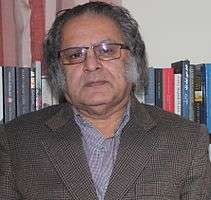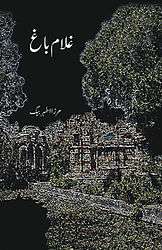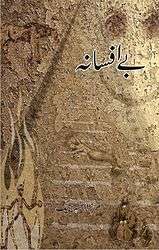Mirza Athar Baig
Mirza Athar Baig is a Pakistani novelist, playwright and short story writer. He has been associated with the Department of Philosophy, at the Government College University in Lahore. His fiction works include the novel Ghulam Bagh (The Garden of Slaves), considered one of the central works of literature in the Urdu language.[1][2][3]
Mirza Athar Baig | |
|---|---|
 | |
| Born | March 7, 1950 Lahore, Pakistan |
| Occupation | Novelist, short story writer, screenwriter, philosopher |
| Residence | Pakistan |
| Alma mater | Government College University, Lahore |
| Notable works | Ghulam Bagh, Sifar se aik tak |
| Spouse | Nabila Athar (1953–2011) |
The novel has been quite popular in Pakistan and critically acclaimed, as five editions have been published since the first one in 2006.[4]
In addition to Ghulam Bagh, a collection of Baig's short stories, titled Beh Afsana (The Non-story) was published in 2008. His second novel, Sifar se aik tak (From zero to one) was published in 2010. In July 2010, the DAWN newspaper published a review of Sifar se aik tak [5] commenting on its popularity with the youth, which Baig's literature is reputed to enjoy in general.[6][7]
His third novel, Hassan Ki Surat-e-Hal, was published in 2014 and has received critical acclaim in Pakistan[8][9][10] as well as in international media.[11][12] With his third novel, Baig explores his comic-realism style of writing in much more depth.
Mirza Athar Baig has also written several television plays, including Daldal, Hissar, Khwab Tamasha and Nashaib. Although he has since taken a break from television writing to fully focus on his literary pursuits.
Works


Novels
- Ghulam Bagh
- Sifr se aik tak
- Hasan Ki Surat-e-Hal
Short stories
- Beh Afsana
Drama (Serial)
- Daldal
- Doosra Asmaan
- Gehray Pani
- Hissar
- Rog
- Khwab Tamasha
- Nashaib
- Yeh Azaad Log
- Pataal
- Baila (Punjabi)
- Sikar Dupair (Punjabi)
- Akhri Show (Punjabi)
Long Play
- Catwalk
- Lafz Ayina Hai
- Dhund Mein Raasta
- Bewazan Log
References
- Writing philosophy that sells, interview in The News International, May 2008.
- The non-fiction novelist, article about Athar Baig in Dawn.com, June 8, 2008.
- Another Edition of Ghulam Bagh
- An interview by Mohammed Hanif Archived 2010-01-09 at the Wayback Machine
- http://jang.com.pk/thenews/sep2010-weekly/nos-12-09-2010/lit.htm
- http://www.dawn.com/wps/wcm/connect/dawn-content-library/dawn/in-paper-magazine/books-and-authors/traditional-forms-can-no-longer-work An interview with the DAWN newspaper
- http://www.dawn.com/wps/wcm/connect/dawn-content-library/dawn/in-paper-magazine/books-and-authors/not-for-the-gurus
- http://tns.thenews.com.pk/interview-with-mirza-athar-baig-author-ghulam-bagh/
- http://epaper.dawn.com/DetailNews.php?StoryText=27_04_2014_461_001
- http://www.laaltain.com/hasan-ki-surat-e-haal-khali-jaghain-pur-karo/
- "mirza novel". www.bbc.co.uk.
- "M.A.Baig". www.dw.de.